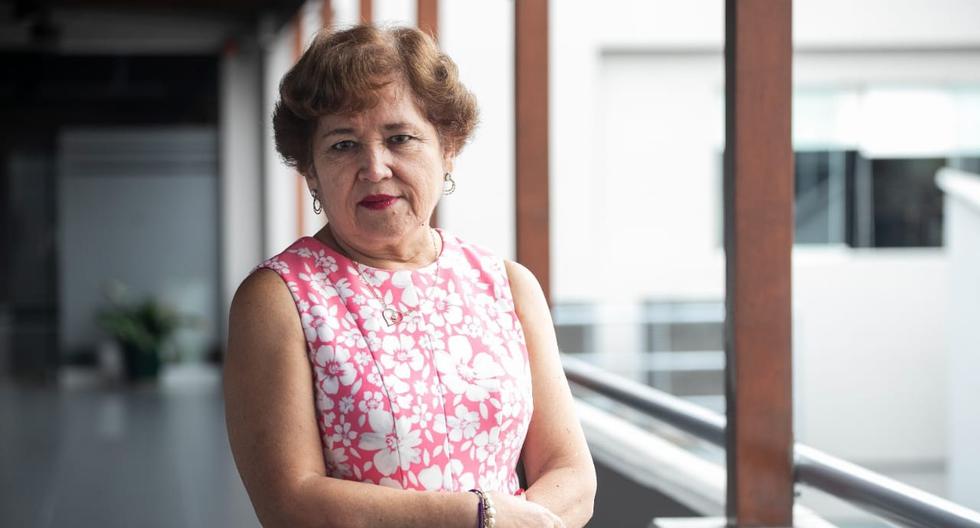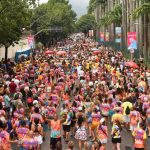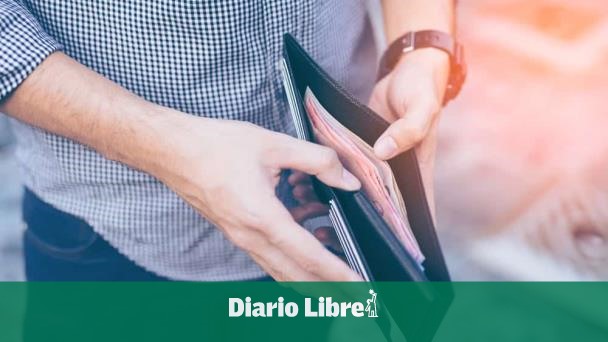sonia medina said goodbye this week to the Anti-Drug Prosecutor’s Office after 20 years of work. In all this time he has become an authoritative voice to explain the violence originated by criminal organizations. He is clear about what is happening in the country and where the problem worsened.
On Saturday the 4th, via publication in El Peruano, we found out that you had stopped being the state anti-drug attorney. Why is Sonia Medina no longer in office?
It has been a very consensual and personal decision. Every human being goes through cycles and stages. I am leaving the Attorney General’s Office calmly, because no one has fired me, and I can continue working elsewhere where there is space or where God decides.
How are two emblematic cases of the Attorney General’s Office now left: the Sánchez Paredes case and the Eteco case (Miguel Arévalo Ramírez)?
The case of the Sánchez Paredes is on the right track by the Attorney General’s Office. The Prosecutor’s Office is in the last stage of the allegations, where it is proving that everything we have demonstrated in these 13 years of investigation and trial is irreversible. I hope that in the case of the Sánchez Paredes, God enlightens the magistrates. As for the case of Eteco, there we have gone from annulment to annulment. Unfortunately there are judges who are quite derogatory to the State itself, obsequious if you will. The latest resolution indicates that the investigations of this person should continue. I hope that this case reaches a trial. If not, everyone will be responsible for it.
In these 20 years in the Attorney General’s Office, with which governments did you have problems to do your job?
I take the satisfaction that I have gone through nine governments, 45 ministers and from all of them I have received the support as an official. I don’t know what policy the current president will have, but let’s hope that there will be a decision to fight against drugs with more support based on the image of the country. As a State, it would have to show itself a ius puniendi and severe authority over organized crime and racketeering.
In Peru, are there only family drug clans or can we talk about cartels?
In Peru we have a bit of everything. The firms, in the eighties and nineties. Then we moved on to family clans with the support of third parties, and now we have highly harmful criminal organizations. If we have to focus on the national territory, they are in almost the entire country and especially in Vraem. There comes the political decision to once and for all take the reins over Vraem.
A government policy of Pedro Castillo was to eliminate the eradication of illicit crops. What damage did that plan do to the country?
The Vraem issue is quite complicated and serious. We have measurements that tell us that we are in an alarming situation with regard to the raw material, coca leaves. The entire national territory is infested with crops. Then we have the production that we fought with Colombia. Drug use is increasing in the country because now more finished products are entering. The most critical thing is that now the average age of consumption in minors is school age. Traffickers do not look at age or color; they care little about humanity. The Constitution makes it clear that it is the State that fights illicit drug trafficking.
:quality(75)/cloudfront-us-east-1.images.arcpublishing.com/elcomercio/CRG7THHLOZBBFI6VN5CQBX2Q2Y.jpeg)
“Possibly many people will celebrate (my departure). We have done drastic things at a professional level and that is the mystique of the Anti-Drug Prosecutor’s Office. Whoever comes should know that,” says Medina.
In December, information from the Police warned that del Vraem was joining the protests in favor of Pedro Castillo. Why do you think this happened?
At some point this fight was handed over to the Vraem Plan, which was managed by the Armed Forces and, from my experience, has had few returns and it would be necessary to prove what results there were. At this time, Vraem is a Medellin in Colombia from the eighties, it is an emerging area, but based on drug trafficking. Hopefully this Social Pact (installed in the Castillo government) will be repealed because what has been done is hand over territory to drug trafficking and other related crimes. Due to dirty money, we now see a unique modernity in areas that before seemed like a village from the Old West.
Castillo’s Social Pact asked cocaleros to carry out voluntary eradication.
Sure, self-eradication. They were all volunteers, but in quotes. Faced with such an opening, no one is going to protest. It was a wicked opening. It is against nature. If the State fights against drugs, why should we open up self-eradication?
In recent years, has drug money infiltrated politics?
It means a lot to them to make that money available, which allows them to continue committing crimes. There would not be so much (drug) trafficking if corruption were not present.
Among the related crimes that he mentions is terrorism. How much do drug trafficking and terrorism serve each other?
We have had very marked decades of terrorism as such. At the dawn of the year 2000, terrorism itself stopped, from the fundamentalism that they manage. I believe that today terrorism as such is re-emerging. Today we see, in acts of violence, that terrorism unfortunately has new voices. We are seeing work on youth bases to germinate a new group of this nature. In the symbiosis that we saw during 2000, the terrorists had been one more body, part of the criminal structure of drug trafficking, either as transport support or internal marketing. There are terrorists who are engaged in production in Vraem and have exchanges with drug traffickers. But little has been done about it. We are seeing what is happening in our country in areas known to produce drug trafficking and in areas that are becoming no man’s land. We cannot afford to do nothing right now and become one Colombia with the FARC.
Does terrorism reappear because the State has given it an advantage?
They are doing underground work on the bases. Right now they are giving us the tails of existence.
And where do we see those tails of existence?
We see it, recently, in the Puno region and other well-marked regions, where there are areas that are maintained with the resources of drug trafficking. All Peruvians have the need to demand postponements, but not in the violent way that is being done right now, and above all because of interests that should separate the wheat from the chaff. There are dead policemen, burned alive. If that is fighting matter, I don’t know.
It has been seen a lot that the objectives have been the headquarters of the Judiciary and the police stations. Is there a relationship between the resurgence that you are talking about and these acts?
I would say yes, because they are the most immediate authorities; in the smallest district there will always be a police station or a Public Ministry that serves as criminal control. Definitely what they do not want is to have a watchdog authority.
What do you think of the work of Congress and the Executive? What is the evaluation of current politicians?
They don’t represent me today. All citizens are very upset with political action, although there are exceptions. For example, I have learned that there is a project for the State’s legal defense to be outsourced. That is handing over the defense of the State to a free market. It is a serious problem.
Early elections?
It is the aspiration of all and the president herself has been responsible for saying so. Unfortunately the previous government put the country in reverse. Everything depends on the current management so that some settle for a longer time or continue protesting for an early election.
And if we go to elections, do you see a viable and coherent option to entrust the country to you?
I believe that there is not something visible at this moment, but that does not mean that there would be characters who, with the greatest convictions and love, could work for the country. Although we also have to be somewhat responsible for who we choose. It does not fit in my head that there are people who enter for personal gain or a miserable deception. People who enter to deliver their district, their province and even the country.
KEEP IN MIND
- Sonia Medina began functions as head of the Anti-drug Prosecutor’s Office in 2002. Before that, she had served as a civil and criminal judge in the PJ.
- The State Attorney General’s Office in charge of Daniel Soria will have to hold a public contest to choose the new anti-drug attorney, a position that is not for everyone.
RECOMMENDED VIDEOS:
:quality(75)/cdn.jwplayer.com/v2/media/2kfMy00u/poster.jpg)


















